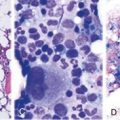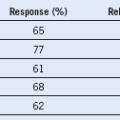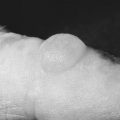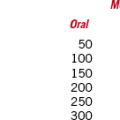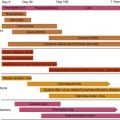Chapter 19 Congenital Disorders of Lymphocyte Function
Diagnostic Approach to Severe Combined Immune Deficiency
• SCID presents early in life with severe infections of bacterial, viral, or fungal origin.
• Opportunistic infections are common in infants with SCID.
• Respiratory infections, protracted diarrhea, and failure to thrive are typical signs at presentation.
• Lymphopenia is present in 50% to 70% of infants with SCID. Age-specific norms must be used in evaluating the ALC because infants and children have much higher ALCs than adults (3500-13,000 cells/mcL in very young infants versus 1000-2800 cells/mcL in adults).
• T-cell lymphopenia is the hallmark of the disease; abnormalities of the absolute count of B and NK lymphocytes are observed in some forms of SCID. However, T lymphocytes may be present in SCID infants with maternal T-cell engraftment or with hypomorphic mutations in SCID-associated genes that allow residual T-cell development. Thus a normal ALC does not rule out SCID.
• Maternally engrafted T cells proliferate in the infant with SCID in vivo, but the vast majority of the time do not proliferate in vitro when stimulated with traditionally used mitogens such as concavalin A and phytohemagglutinin, as measured by thymidine incorporation. Thus, if SCID is suspected but T cells are detectable, maternal engraftment studies and proliferation to mitogens must be done.
• Universal newborn screening has now been piloted in a growing number of states since 2009. The analyte is detection of TRECs by quantitative polymerase chain reaction. TRECs are high in newly generated T cells and low when T cells are absent or when maternally engrafted T cells are present.
• SCID is genetically heterogeneous. The most common form in Western countries is inherited as an X-linked trait and is T− B+ NK−.
• The lack of all lymphocytes (T− B− NK− SCID) is highly suspicious for the ADA form of SCID in which toxic metabolites result in death of all lymphocytes. Testing for ADA enzyme level is critical because if confirmed to be absent, treatment with PEG-ADA can often result in sufficient reconstitution of T-cell immunity to protect the baby from infection.
Therapeutic Approach to Severe Combined Immune Deficiency
• HCT is the mainstay of treatment. Optimal survival is achieved when the transplant is performed early in life. This is now possible with newborn screening.
• Transplantation for SCID can be performed without conditioning because of the profound absence of T cells and inability to reject. Thus the bone marrow of a fully HLA-matched sibling can be infused without manipulation and without giving any conditioning to the baby. GVHD prophylaxis is also not necessary. Haploidentical bone marrow from a parent can also be infused without conditioning but must first be T-cell depleted.
• Such transplants without conditioning can result in T-cell reconstitution that lasts for decades. In the case of a matched sibling graft, initial T-cell reconstitution is rapid, generally within the first 1 to 3 months, because of proliferation of mature T cells. In the case of a haploidentical graft, mature T cells are removed, so 4 to 6 months is required for HSCs to develop and emerge from the thymus as mature T cells.
• Without conditioning, few long-lived HSCs from the donor engraft, which may lead to a lack of donor B-cell reconstitution and a lack of humoral immunity. With conditioning, donor HSCs are more likely to engraft and give rise to donor B cells. Currently, matched unrelated donor transplants are performed with conditioning.
• Enzyme replacement may be used in patients with adenosine deaminase deficiency. Gene therapy has offered promising results, but it is also associated with an increased risk of leukemic proliferation because of insertional mutagenesis.
Diagnostic and Therapeutic Approach to Cytotoxicity Defects
• PID with defects of cell-mediated cytotoxicity includes a heterogeneous group of disorders characterized by increased susceptibility to severe viral infections.
• Typical clinical features include high fever, liver and spleen enlargement, lymphadenopathy, coagulation defects, abnormalities of liver function, and cytopenias after viral infections.
• Two major groups of cell-mediated cytotoxicity defects include familial forms of hemophagocytic lymphohistiocytosis (fHLH) and X-linked lymphoproliferative disease. In the former, diagnosis is based on demonstration of abnormal cytotoxic function of T and NK lymphocytes. Defective expression of CD107a on activated lymphocytes or reduced expression of perforin may help define the nature of the underlying disorder causing fHLH.
• Prompt recognition and treatment of the underlying infection is essential. Immunosuppression is also required to block exaggerated inflammatory responses. However, the only curative approach to defects of cell-mediated cytotoxicity is represented by HCT. Mixed chimerism is sufficient to allow immune reconstitution. This goal can be achieved with reduced-intensity conditioning, with a lower risk of treatment-related toxicity.
Diagnostic and Therapeutic Approach to Defects in Humoral Immunity
• Defects in humoral immunity may be attributable to intrinsic defects in B-cell development and function or combined immunodeficiency disorders in which a lack of T-cell help is the primary cause of B-cell dysfunction.
• Age-specific norms must be used for children. IgG levels at birth reflect the maternally transferred antibody, which nadir between 2 to 6 months and then progressively rise with age. IgA and IgM levels rise continually with age until the teenage years.
• Based on enumeration of T, B, and NK cells, XLA (absence of B cells) can be rapidly ruled out.
• The finding of hyper-IgM with low IgG should prompt a workup for CD40L deficiency, CD40 deficiency, AID, and UNG. The likelihood of each of these is, of course, different depending on gender and family history. It is important to note that CD40L deficiency may present with a normal IgM.
• The diagnosis of CVID should only be made after other causes have been ruled out and should be made with caution, if at all, in children younger than 4 years of age. Disorders such as XLA, autosomal recessive agammaglobulinemia, various hyper-IgM syndromes, and XLP should be specifically considered and ruled out. Other diseases that may masquerade as CVID include other combined immunodeficiencies, cystic fibrosis, HIV, and conditions leading to immunoglobulin loss such as protein-losing enteropathy. Medications may cause a picture that looks like CVID. Finally, in adults, hypogammaglobulinemia may herald the development of thymoma or lymphoid malignancies and therefore may be secondary to evolving neoplasia.
• Treatment of patients with XLA and the hyper-IgM syndromes other than CD40L deficiency is long-term IVIG replacement, which is very effective.
• Experts disagree on whether patients with CD40L deficiency should be treated with early HCT, and currently, there are no clear predictors to determine who is likely to experience opportunistic infections. A patient with CD40L deficiency who has developed Cryptosporidium infection and sclerosing cholangitis generally has a much worse outlook with HCT.
• Treatment of patients with CVID with HCT is generally reserved for those with an alternate reason for allogeneic transplant such as lymphoid malignancy or lymphoproliferation that requires continual immunosuppression.

